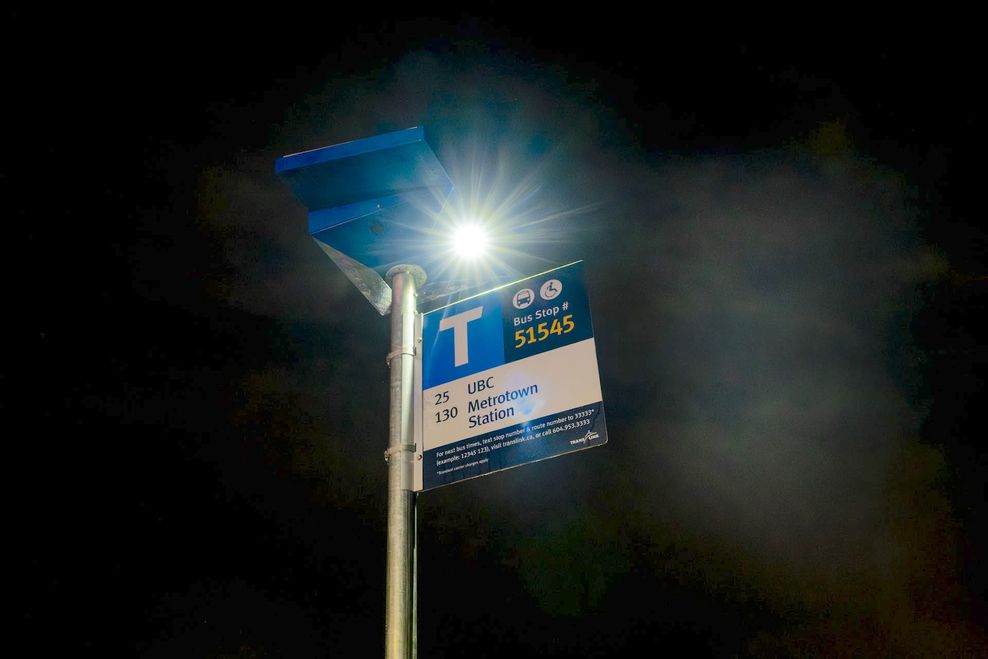Lifestyle
TransLink Trials Solar-Powered Lights at Bus Stops for Safety

TransLink is launching a pilot project aimed at enhancing safety and visibility at select bus stops across Metro Vancouver. The public transit authority announced on March 15, 2024, that it will test solar-powered lights mounted atop bus stop signs. This initiative targets areas with higher ridership and a recognized need for improved nighttime lighting, benefiting both bus drivers and waiting passengers.
The innovative lighting system, designed by the British Columbia-based company Urban Solar, features LED bulbs powered by solar panels. Passengers can activate the light using a button located on the bus stop pole, significantly improving visibility during dark hours. This project is part of TransLink’s ongoing commitment to modernize its services and enhance the overall customer experience.
In its 2024 Open Call for Innovation, TransLink received a total of 24 submissions from various organizations. Urban Solar’s proposal was one of two selected, with the other being from Hayden AI, which suggested implementing automated bus lane enforcement technology. TransLink is currently evaluating the feasibility of this second proposal.
TransLink CEO Kevin Quinn emphasized the importance of this initiative, stating, “We’ve heard from riders that lighting makes a big difference at bus stops, and this pilot will help us explore how solar technology can make waiting for the bus safer and more comfortable.” Quinn’s statement highlights a direct response to passenger feedback regarding safety and comfort.
The solar lighting has already been installed at nine bus stops, with an additional five locations set to be equipped in the coming weeks. Input from both bus drivers and passengers during this trial will guide future decisions on whether to expand the use of these lighting fixtures to more bus stops throughout the region.
Despite the positive steps being taken, a significant number of bus stops in Metro Vancouver lack shelters to protect passengers from inclement weather. This aspect falls under the jurisdiction of municipal governments rather than TransLink. Nonetheless, previous initiatives from TransLink’s Open Call for Innovation have included various advancements, such as energy-capturing technology for SkyTrain vehicles and shared mobility platforms.
As the pilot project progresses, the impact of solar-powered lighting on the transit experience in Metro Vancouver will be closely monitored, with the aim of ensuring a safer and more comfortable environment for all passengers.
-

 Politics2 weeks ago
Politics2 weeks agoSecwepemc First Nation Seeks Aboriginal Title Over Kamloops Area
-

 World4 months ago
World4 months agoScientists Unearth Ancient Antarctic Ice to Unlock Climate Secrets
-

 Entertainment4 months ago
Entertainment4 months agoTrump and McCormick to Announce $70 Billion Energy Investments
-

 Lifestyle4 months ago
Lifestyle4 months agoTransLink Launches Food Truck Program to Boost Revenue in Vancouver
-

 Science4 months ago
Science4 months agoFour Astronauts Return to Earth After International Space Station Mission
-

 Technology3 months ago
Technology3 months agoApple Notes Enhances Functionality with Markdown Support in macOS 26
-

 Top Stories1 month ago
Top Stories1 month agoUrgent Update: Fatal Crash on Highway 99 Claims Life of Pitt Meadows Man
-

 Sports4 months ago
Sports4 months agoSearch Underway for Missing Hunter Amid Hokkaido Bear Emergency
-

 Politics3 months ago
Politics3 months agoUkrainian Tennis Star Elina Svitolina Faces Death Threats Online
-

 Politics4 months ago
Politics4 months agoCarney Engages First Nations Leaders at Development Law Summit
-

 Technology4 months ago
Technology4 months agoFrosthaven Launches Early Access on July 31, 2025
-

 Top Stories4 weeks ago
Top Stories4 weeks agoFamily Remembers Beverley Rowbotham 25 Years After Murder





















